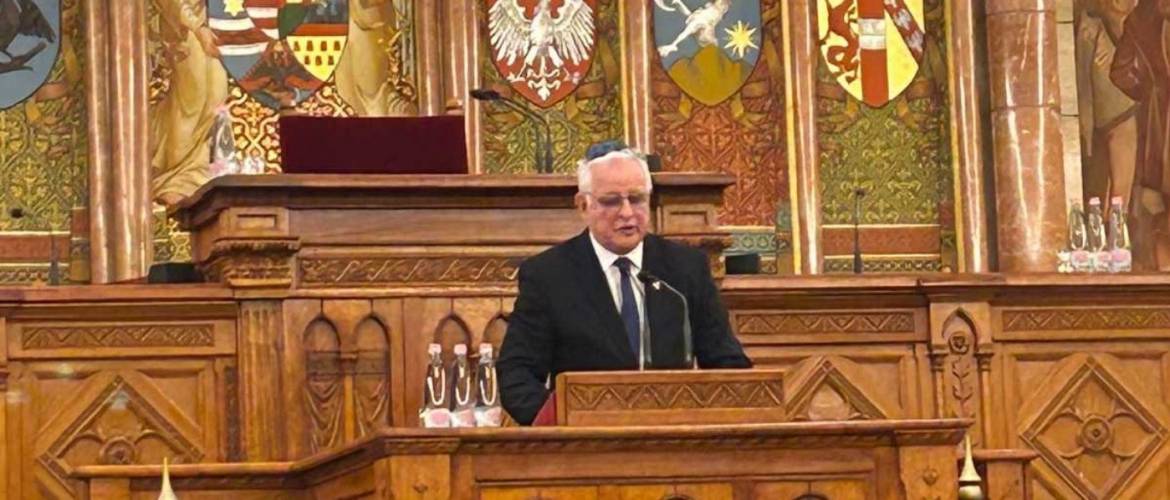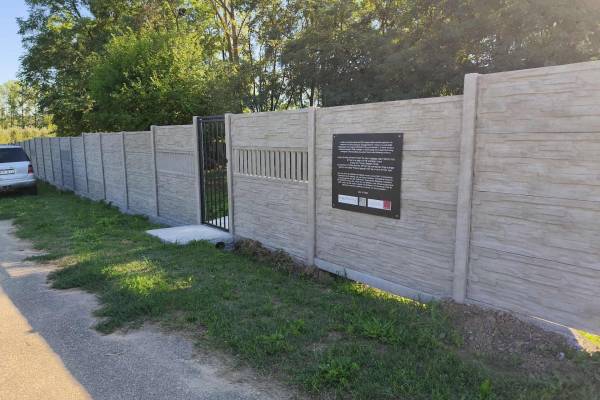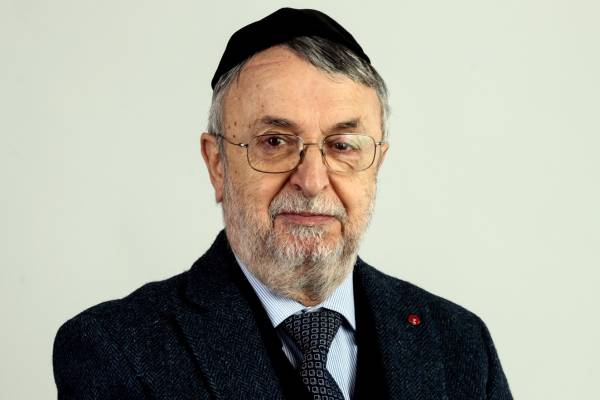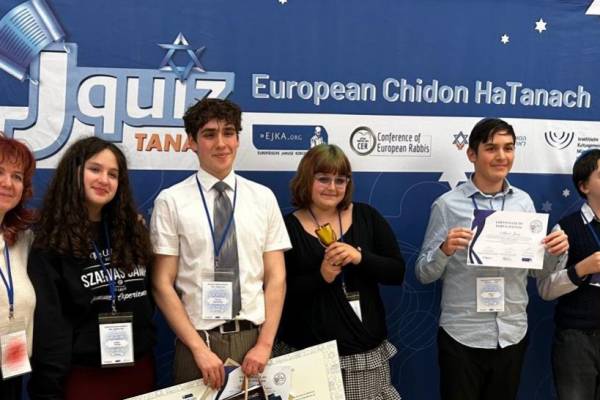„After
80 years, the perpetrators of the mass murders are no longer here, and no
Hungarian alive today is responsible for the actions of their ancestors. But
all Hungarians alive today are responsible for ensuring that the atrocities
never happen again, under any circumstances.
Every
Hungarian living today, the entire Hungarian nation, has a responsibility to
learn from our history, to recognize the forces and the steps that set hatred
in motion and led it down the path to tragedy.” said Dr. Andor Grósz, president
of Mazsihisz, in the Upper House of the Parliament on April 16. Below is the
full text of the speech.
Esteemed
gathering of remembrance,
It is
with sadness and regret that I stand here, in the upper house of the
Parliament, where every corner, every wall, every padded seat and this pulpit
are steeped in the history of Hungary. The terrible part of Hungarian history
that took place here, more than eight decades ago, in this very hall, where Dr.
Immanuel Löw, the world-famous rabbi of Szeged, represented Hungarian Jews from
1926 until October 1940, when he was removed from here under the anti-Semitic
laws. Deported from the Szeged ghetto in 1944, the dying 90-year-old scholar
was removed from the Auschwitz-bound cattle car in Budapest and allowed to die
here on Hungarian soil, in his beloved homeland, unlike hundreds of thousands
of his fellow citizens who were murdered in a foreign land.
I stand
here in this room, which has witnessed the rise of anti-Semitism, which has
been embodied in the creation of anti-Semitic laws, "laws" that have
known neither law nor justice, which have humiliated, plundered, and
marginalized hundreds of thousands of Jewish citizens of this country. To a
place from which they were only one step away from the 'final solution' of mass
murder, which they did 80 years ago today, the genocide began! On this day we
remember this Hungarian tragedy.
I stand
here in this Chamber, thinking of those Jewish members of the Upper House who
represented the best of Hungarian industry, engineering and mining, who were
excellent economists and legal scholars, but all this did not save them from
deportation, from death marches, from Auschwitz. Neither they, nor hundreds of
thousands of others, who were not members of the upper house, but who were, as
far as their own talents and abilities allowed, hard-working citizens of that
Hungarian homeland, valuable, proud members of the Hungarian nation, whose
decision-makers, driven by the most despicable passions, anger and greed, cast
them out and delivered them into the hands of murderers, did not escape.
The
tragedy of the Holocaust is not just the loss of hundreds of thousands of
lives, not just their deaths, not just the suffering of survivors whose lives
were crippled by the loss of loved ones, not just the horror of immense pain
passed down through generations. The tragedy of the Holocaust is also the loss
of the future, of prosperity, of thriving, of a blooming future. The loss that
the Shoah has caused and continues to cause to Hungarians is still felt today,
and cannot be quantified or measured. After all, how could one count how many
things, how many mothers and grandmothers, how many fathers and grandfathers,
how many workers and peasants, how many teachers, how many creative artists,
engineers, doctors, Nobel Prize-winning scientists Hungary lost, whose
political elite and bureaucratic machinery of the time sent children and
capable people to their destruction?
The
flourishing Jewish religious life, which had made the Jewish spirituality of
the Carpathian Basin so rich, was also destroyed. The representatives of the
various Jewish religious movements disappeared, our schools and institutions
have been emptied and disappeared, our synagogues covered in silence, and in
the streets where once the thousands of bustling voices of human life filled
the air, there was only silence. Where once hundreds of synagogues were filled
with worshippers, in rural Hungary, there is hardly a community left to say a
prayer for the victims, and most of the hundreds of synagogues have been torn
apart by the bricks by greedy hands.
Every
human being is precious, every human life sacred and worth preserving. There
are those among us who, by virtue of their talent, diligence, or simply by good
fortune, can achieve more. With them, with their achievements, we measure the
success of a nation. I am convinced that I do not need to list for you how much
the Hungarian people, Hungarian culture, Hungarian literature, Hungarian
architecture, Hungarian science, the Hungarian economy or Hungarian sport owe
to Hungarian Jews.
I stand
here saddened because it was in this very room that the high clergy of the
Christian denominations, renouncing their own principles, made their speeches
in support of the anti-Semitic laws. After the Holocaust, all those
denominations finally did some introspection and expressed their regret for the
role they had played in the marginalization of the Jews. This introspection,
this understanding of this tragic chapter in history, is now facilitated by the
educational programs that have become an indelible part of our entire education
system, but it would be good for everyone, every village and town, every
community, every family, to carry out an introspection.
Ladies
and Gentlemen! In the words of the Talmud, "Sin is not hereditary, sons
are certainly not responsible for the sins of the fathers, but they are capable
of acquiring merits whose glory will be shared by the fathers." Today's
generations are not responsible for the actions of their forefathers, but they
are largely responsible for ensuring that the actions of their forefathers are
not repeated. They are responsible for ensuring that what happened in the past
is honestly passed on to future generations.
After 80
years, the perpetrators of the mass murders are no longer here, and no
Hungarian alive today is responsible for the actions of their ancestors. But
all Hungarians alive today are responsible for ensuring that the atrocities
never happen again, under any circumstances.
Every
Hungarian living today, the entire Hungarian nation, has a responsibility to
learn from our history, to recognize the forces and the steps that set hatred
in motion and led it down the path to tragedy. This is particularly important
today, when we see that the flames of anti-Jewish hatred have once again flared
up. It is feared that if Jews and non-Jews do not unite to curb the hatred, not
only Jewish life but our entire civilization could once again be set aflame.
Now is the time to show the real value of the fine phrase: NEVER AGAIN. Now, at
a time when anti-Semitism is on the rise, society must show that it knows what
it must do to defend the dignity and lives of the innocent. Now is the time for
everyone to prove that they will not hesitate to do whatever is necessary to
fight exclusion and anti-Semitism. This is what all responsible people must
recognize.
Ladies
and Gentlemen, I stand here before you in this hall steeped in history, in awe.
Proud, because the murderers did not achieve their goal, the Jews could not be
exterminated, and they could not be erased from Hungarian history. Today, here
in this hall, we proclaim with our presence the lives of our ancestors and
their terrible deaths. Even if in much smaller numbers, Jews still live in
Hungary today - and there is a thriving Jewish community life. Those who tried
to take the lives of our ancestors have failed. And just look around the
Rumbach synagogue! Where a few years ago, the ruins were dominant, today the
beautifully renovated interior glorifies the greatness of the Eternal and the
triumph of human energy. Just as the Rumbach was revived, so Hungarian Jewry
was revived, new Jewish communities were created, new synagogues were opened,
Jewish institutions were established, new organizations were formed. Eighty
years after the Holocaust, we have not recovered from the loss caused by the
Holocaust and we will never recover from it, but it can be said that there is a
flourishing Jewish life in Hungary again, and there are Jewish communities in
Israel originating from here, forming a living link between the two countries.
This is
especially important now, when Israel and the Jewish people are under
unprecedented attack, when eight decades after the Holocaust, innocent blood is
being shed, when babies and old people are being murdered or taken from their
homes. When the flame of anti-Semitism is once again burning high,
unprecedented high, around the world. Now is the time to resist it, now is the
time to put a stop to it. That much we have learned from history.
Ladies
and Gentlemen!
As I
stand here before you, I am strengthened by the feeling that my grandmother,
grandfather and 43 other relatives who were murdered during the Holocaust are
behind me. And standing beside me could be tens of thousands of my fellow Jews,
with their own murdered family members behind them. And standing here, with all
our respect and eternal gratitude, would be the rescuers, the small group of
the brave and the decent who managed to remain humane in a sea of cruelty and
ruthlessness. We owe them the lives of many, not only lives, but also hope for
a just world and faith in humanity.
In
memory of our martyrs, let me quote the words of André Schwartz-Bart:
How to
mourn your death,
How to
follow your coffins,
For you
are a handful of stray ashes
Between
heaven and earth.
In their
honor, on the 80th anniversary, I will place a memorial stone in Auschwitz, the
largest Hungarian cemetery.
May
their memory be blessed!
Zichronam Livracha

 02.20. 16:56, kimenete: 02.21. 18:02
02.20. 16:56, kimenete: 02.21. 18:02 





